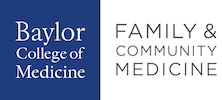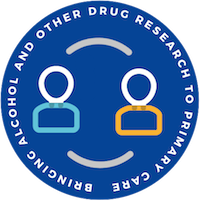


Course registration is now closed.
The other resources on this site remain freely accessible without registration.If you have previously registered for the course, you can continue access by login.
Welcome to
Bringing Alcohol and Other Drug Research to Primary Care

Alcohol consumption, drug overdose, and youth vaping rates have been surging since before the pandemic began. Primary care practices need efficient and evidence-based tools to address the increased risk of substance-related health problems in their patients.
The Department of Family and Community Medicine at Baylor College of Medicine and Behavioral Health Solutions of South Texas invite you to participate in Bringing Alcohol and Other Drug Research to Primary Care, an online training aimed at disseminating the latest research on alcohol, nicotine, and opioid use prevention and treatment strategies for primary care providers.
This website features a 6-module, CME/CEU-approved, interactive course. You will also find alcohol, nicotine and opioid use disorder resources for healthcare providers and patients.
Post-training, you may opt to receive updates tailored to your practice with our Academic Detailers through 2 asynchronous and 2 brief synchronous contacts over the next 6 months.
Contact our team, based in Houston and the Rio Grande Valley, at the link above for more information.
Latest News
- Patients prescribed higher buprenorphine dose are more likely to stay in treatment for OUD
- Overdose deaths decreased 3% in 2023 but still on track to exceed 1 million this decade
- Teen illicit drug use decreases, but overdose deaths continue to rise
- Deaths from excessive alcohol use have increased 29%
- Naloxone OTC on retail shelves now
- Less than 1% of adults with alcohol use disorders receive naltrexone or acamprosate, effective medication treatments
What participating providers are saying:
This self-paced program includes an Interactive Online Course and the option to opt into academic detailing.
Bringing Alcohol and Other Drug Research to Primary Care is relevant to any healthcare professional that works with patients impacted by substance use.
Evidence-based Interventions to Address Nicotine, Alcohol, and Other Substance Use in Primary Care
Upon course completion, you are eligible for a $20 gift-certificate and 1-hour of continuing education through either of the following pathways:
- 1-hour of prescribed CME credit from the American Academy of Family Physicians, which also satisfies 1-hour of the ethics CME requirement for the Texas Medical Board
- 1-hour of CEU credit - provided for behavioral licensees (Social Work, LCDCs, LPCs, LMFT)
There are 6 self-paced modules that can be completed in any order. You can exit the program at any time, and resume from where you left off.
What you will learn:
With this course you will learn how to incorporate the latest evidence-based practices for addressing substance use problems in the primary care setting.
Syllabus:
Learning Objectives:
- Describe the substance use continuum.
- Define standard drink and excessive drinking levels for healthy adults.
- List evidence-based screening tools for substance use.
- Discuss the workflow of substance use screening in the primary care setting.
Completion time: About 10 minutes
Learning Objectives:
- Explain the Transtheoretical Model (TTM) (or Stages of Change).
- Discuss key principles and practices of Motivational Interviewing (MI).
- Apply the TTM and MI in conducting brief interventions to address substance use.
Completion time: About 10 minutes
Learning Objectives:
- List medication options for treating NUD.
- Discuss incorporation of medications for nicotine use disorders (MNUD) in primary care.
Completion time: About 5 minutes
Learning Objectives:
- List medication options for treating AUD.
- Discuss incorporation of medications for alcohol use disorders (MAUD) in primary care.
Completion time: About 5 minutes
Learning Objectives:
- List medication options for treating OUD.
- Discuss incorporation of medications for opioid use disorders (MOUD) in primary care.
Completion time: About 5 minutes
Learning Objectives:
- Incorporate trauma-informed care for patients including those with substance use disorders in the primary care practice.
- Recognize and address stigma in the primary care setting associated with persons using substances.
Completion time: About 5 minutes
- Once you have completed all 6 modules you will be directed to the Post-Training Survey to claim your CME/CEU certificate.
Survey completion time: About 10 minutes
- 1 hour CME/CEU credit
- Satisfies 1 hour of TMB ethics requirement
- 1 hour to complete
- 100% Online
- Self-Paced
- Up to $100 in gift certificates
- Treating Tobacco Use and Dependence, 2008 Update: Clinical Practice Guideline
A comprehensive document, this guideline contains evidence-based strategies and recommendations designed to assist clinicians, tobacco dependence treatment specialists, and others in delivering and supporting effective treatments for tobacco use and dependence.
- Help for Smokers and Other Tobacco Users
Available in both English and Spanish, this booklet is a companion of the Treating Tobacco Use and Dependence: 2008 Update Clinical Practice Guideline. It is written in an easy-to-understand format and includes educational and motivational messages and resources to help patients/consumers quit smoking.
- Quick Reference Guide for Clinicians
This Quick Reference Guide for Clinicians presents summary points from the Clinical Practice Guideline, in particular, the guideline strategies for providing appropriate treatments for every patient.
- Helping Smokers Quit: A Guide for Clinicians
This pocket guide outlines the 5 A’s (Ask, Advise, Assess, Assist, Arrange) that clinicians can employ to encourage patients to quit tobacco use.
- Tips From Former Smokers® campaign materials for healthcare settings
Free materials from the CDC’s Tips from Former Smokers campaign. Includes handouts, posters, and videos that can be shared with patients.
- Clinicians can order free notepads or download and print single pages
- Using Alcohol Screening and Brief Intervention to Address Patients' Risky Drinking
Outlines how to integrate alcohol screening and brief intervention (aSBI) into your practice in three steps: establishing a workflow, incorporating aSBI prompts into your EHR system, and ensuring appropriate coding to receive payment.
- Underage college drinking guide for clinicians
Guide from the National Institute on Alcohol Abuse and Alcoholism that provides information about potential interventions to address harmful and underage college student drinking.
- NCQA Unhealthy Alcohol Use Screening and Follow-Up
Describes the Unhealthy Alcohol Use Screening and Follow-Up rates reported on the Healthcare Effectiveness Data and Information Set (HEDIS) and why these measures are important in clinical practice.
- Elimination of the X Waiver
Effective immediately, all clinicians with valid DEA registration to prescribe Schedule III medications can now use buprenorphine to treat OUD without patient panel size limits and in person or via telehealth. A one-time, 8-hour training on OUD and other SUD prevention and treatment for all DEA registrants is required by June 21, 2023.
- Quick Start Guide
Includes protocols and forms to facilitate rapid incorporation of buprenorphine OBOT into primary care practices.
- Substance Use Clinician Warmline
The HRSA-supported Substance Use Warmline provides clinician-to-clinician consultation (via phone or online), assisting primary care clinicians and health center staff in addressing the issues related to treating SUD, chronic pain, and behavioral health.
- Provider Clinical Support Services (PCSS)
This SAMHSA-sponsored service provides a comprehensive set of resources, trainings, and tools on opioid treatment, including pain management. PCSS also provides access to coaching and mentoring services and offers buprenorphine waiver training for clinicians (physicians, nurse practitioners, and physician assistants).
- SAMHSA TIP 63: Medications for Opioid Use Disorder
A comprehensive review with practical information, tools, and resources on screening, assessment of appropriate level of care, MOUD with dosing guidelines, behavioral health therapy, and peer supports.
- Overdose Education and Naloxone Distribution Resource
Order up to 108 boxes (two doses per box) of naloxone per month, conveniently shipped to your practice for FREE through this UT Health San Antonio School of Nursing sponsored website. Access free opioid overdose and naloxone distribution trainings and additional resources.
- CDC Guideline for Prescribing Opioids for Chronic Pain
Resources and materials for health professionals prescribing opioid pain medication for patients 18 and older in primary care settings.
- Overdose Prevention and Response Toolkit
Guidelines for clinicians and the general public from the Substance Abuse and Mental Health Services Administration (SAMHSA) on recognizing and responding to an opioid related overdose.
- Incorporating Alcohol Screening and Brief Intervention Into Practice
Learn to integrate alcohol screening and brief intervention seamlessly into your practice’s current workflow, keeping physicians’ and practice team members’ work to a minimum.
- Medication Treatment Models of Care for OUD in Primary Care Settings
This technical brief from AHRQ is a go-to resource for MOUD models of care delivery in primary care, including the Massachusetts nurse care manager model and the Vermont hub-and-spoke model.
- SBIRT (Screening, Brief Intervention, Referral to Treatment) Oregon
This website presents information and tools for primary care clinics to overcome common perceived barriers using a team-based approach to implementing SBIRT.
- Implementing MOUD in Rural Primary Care Practices
This document from AHRQ summarizes tools and resources for implementing MOUD in a rural primary care setting.
- Tobacco Cessation Tools & Resources
This is an AAFP collection of toolkits, coding and payment information, and patient education materials to support patient care strategies for decreasing tobacco and nicotine use.
- SAMHSA Opioid Overdose Prevention Toolkit
This toolkit offers strategies to health care providers, communities, and local government officials for developing practices and policies to help prevent and manage opioid-related overdoses and deaths.
- Practical Tools for Prescribing and Promoting Buprenorphine in Primary Care Settings
This is the latest SAMHSA publication to provide an all-in-one toolkit for treating patients with opioid use disorder in the primary care practice.
- SBIRT & Medicare booklet
This booklet gives the following information about Medicare and Medicaid coverage of SBIRT services:
- Eligible providers
- Covered SBIRT services
- Documenting SBIRT services
- Billing SBIRT services
- Dually eligible Medicare-Medicaid beneficiaries
- Resources
- UCSF SBIRT app
Free application for incorporating SBIRT into clinical practice.
QUICK LINKS
Nicotine
Alcohol
Opioids
- Help for Smokers and Other Tobacco Users
Available in both English and Spanish, this booklet includes educational and motivational messages and resources to help people quit smoking.
- Reasons to Quit Smoking pdf
[PDF – 19.7 MB] - patient handout
- How to Quit Smoking
cdc.gov
- Tobacco Addiction
- "Why Do I Smoke" Quiz
- Quit Smoking Guide
- JUUL® Fact Sheet
- Infographic - Top Tools for Quitting
- Alcohol Treatment Navigator
- Rethinking Drinking
- Treatment for Alcohol Problems: Finding and Getting Help
- Drinking and Your Pregnancy
- Harmful Interactions: Mixing Alcohol with Medicines
- Alcoholics Anonymous (AA)
(or check your local phone directory or online for a chapter near you)
- Moderation Management
- Secular Organizations for Sobriety
- SMART Recovery
- Women for Sobriety
- Substance Abuse and Mental Health Services Administration
For information about substance use prevention and treatment services:
- 24-hour Help Hotline: 1-800-662-HELP (4357)
- Treatment Facility Locator and Other Resources
- Prevention of Substance Use and Mental Illness
- Publications Store: 877-726-4727
- National Institute on Drug Abuse (NIDA)
For information about substances and substance use disorders including opioids.
- View the NIDA Website in Spanish
- Responding to an Opioid Overdose
Request up to one box (two doses) of naloxone per month, conveniently shipped to you for FREE. Get free opioid overdose response training through this UT Health San Antonio School of Nursing sponsored website.
- Overdose Prevention and Response Toolkit
Guidelines for clinicians and the general public from the Substance Abuse and Mental Health Services Administration (SAMHSA) on recognizing and responding to an opioid related overdose.
- Words Matter: Preferred Language for Talking About Addiction
Learn about stigma, how it affects people with substance use disorder, and how simple changes in language can help reduce and avoid harmful stigma and negativity around addiction.
- Drug Facts
Plain language summaries on different drugs.
- Drugs, Brain, and Behavior: The Science of Addiction
Explanation of the impact of drugs and addiction on the brain.
- Easy-to-Read Drug Facts
Pictures and videos about addiction and treatment in easy to read format.
QUICK LINKS
Nicotine
- Help to Quit Smoking - Quitline
- 1-800-QUIT-NOW (1-800-784-8669)
- Help to Quit Smoking - Quitline
Alcohol, Opioids and other Drugs
- Get FREE Narcan
- Find Your Closest Treatment Program
- About SAMHSA’s National Helpline
- 1-800-662-HELP (4357)
Self-Help
Co-Directors


Dr. Alicia Kowalchuk, DO, FASAM
is an Associate Professor with BCM’s DFCM and board certified in both family and addiction medicine. She is medical director of three programs providing treatment and other services to Houston-area community members impacted by substance use and substance use disorders. Additionally, she has current and past research and programs funded by the CDC, NIAAA, NIDA and SAMHSA and numerous peer-reviewed publications.Team Members
Dr. Kiara K. Spooner, DrPH, MPH, CHES
provides expertise in Academic Detailing and is an Assistant Professor in DFCM at BCM. She is an experienced educator, researcher, epidemiologist and Certified Health Education Specialist who has previously served in a related role, as a trainer of healthcare professionals for a CDC-funded FASD Practice and Implementation Center (PIC) and High Impact Project aimed at integrating alcohol screening and brief intervention into primary care settings. Dr. Spooner’s research is centered on patient-provider communication quality, eHealth technologies, and the reduction of health disparities among racial/ethnic minority and underserved populations.
Dr. Sandra Gonzalez, PhD, LCSW
provides expertise in Academic Detailing and Qualitative Evaluation and is an Assistant Professor and Licensed Clinical Social Worker in DFCM at BCM in Houston, TX. Dr. Gonzalez has over 16 years of experience in clinical and academic settings with roles as a practicing clinician, researcher, and educator. She is the Director of Behavioral Health for the Baylor Family Medicine Faculty Group Practice and the Director of Operations for the department’s Center for Primary Care, Prevention, and Population Health where she is involved in overseeing many of the department’s research and grant initiatives.
Dr. Larissa Grigoryan, MD, PhD
provides expertise in Program Evaluation and is an Assistant Professor in the DFCM at BCM and the Veterans Affairs Center for Innovations in Quality, Effectiveness and Safety (IQuESt). She obtained her PhD in epidemiology from the University of Groningen in The Netherlands and completed a Primary Care Research fellowship at BCM in Houston, Texas. Dr. Grigoryan uses her expertise in epidemiology to design and analyze experimental, quasi-experimental and observational studies in primary care, with funding from NIH, Agency for Healthcare Research and Quality (AHRQ) and VA Health Services Research and Development Service.
Blanca Martinez, MA, LCDC
serves as the RGV-based Program Director and Academic Detailing Supervisor. She earned her Bachelor of Science in Psychology in 2009 and a Master’s of Arts in Clinical Psychology in 2015 from the University of Texas Pan American. She is credentialed as a Licensed Chemical Dependency Counselor, Peer Specialist Supervisor, and Licensed Professional Counselor-Intern. Blanca has served as Director of Clinical Programs with BHS for 4 years. Her work experience includes the mental health services delivery for adults and youth and a current focus on intervention, treatment, and recovery programs with the substance using population.
Kylie Schaper, MPH, CHES®
serves as Program Coordinator and is a Research Operations Associate in the DFCM at BCM. She previously worked at the City of Houston Health Department (HHD) as a public health educator and as the administrative lead for the HHD Laboratory COVID-19 testing team. She became a Certified Health Education Specialist and interned at the Brazos County Health department before graduating from Texas A&M University with a bachelor’s degree in Community Health in 2018. Kylie graduated from the University of Texas Health Science Center with a Master of Public Health in Community Health Practice in May 2022.Academic Detailers
